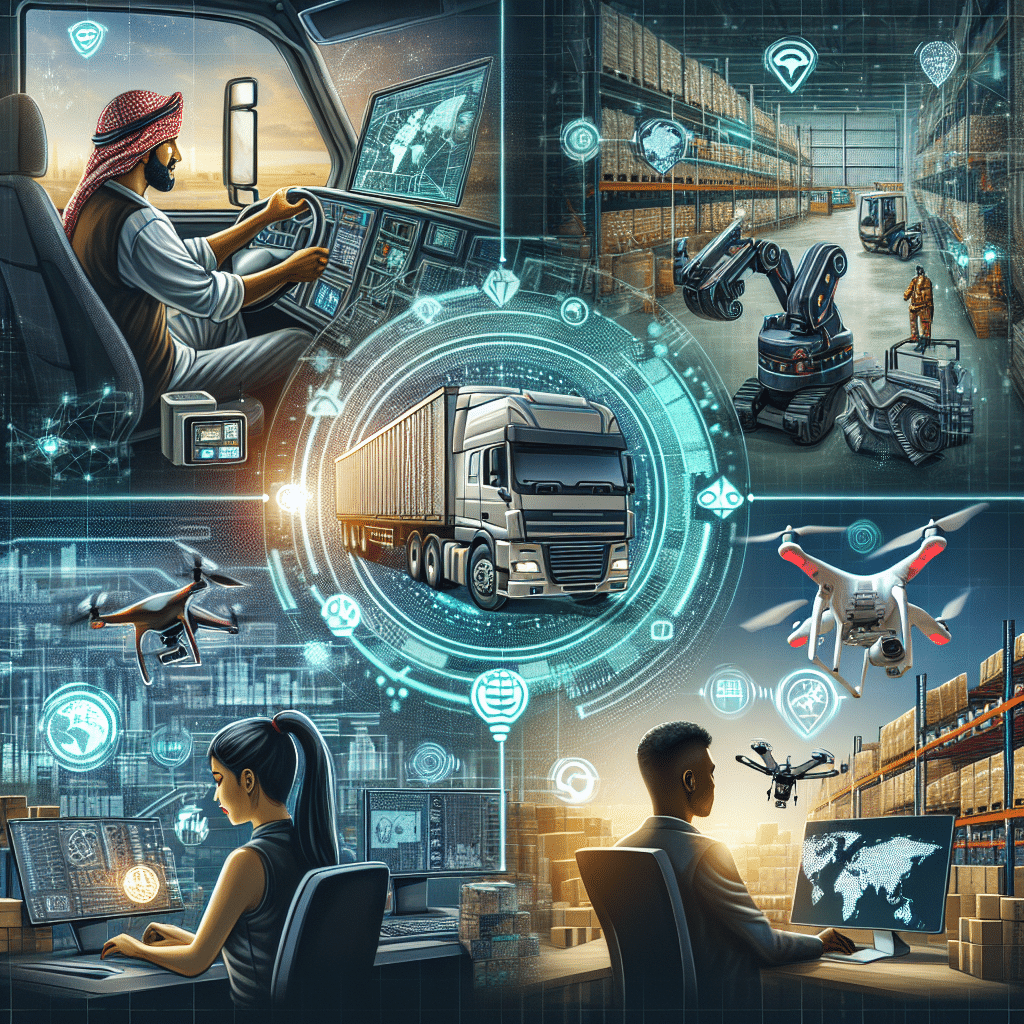How Do Tech Innovations Shape Logistics?
-
Table of Contents
- Tech Innovations Revolutionizing the Logistics Industry
- The Impact of Automation and Robotics
- Artificial Intelligence and Machine Learning
- Blockchain for Enhanced Transparency and Security
- Internet of Things (IoT) for Real-Time Monitoring
- Autonomous Vehicles and Drones in Delivery
- 3D Printing for On-Demand Manufacturing
- Conclusion: Embracing the Future of Logistics
- Enhance Your Logistics Operations with ETprotein’s High-Quality Protein Products
Tech Innovations Revolutionizing the Logistics Industry

The logistics industry is the backbone of global trade, ensuring that goods are delivered from point A to point B efficiently and reliably. However, the rapid pace of technological innovation is reshaping this critical sector. From artificial intelligence to autonomous vehicles, technology is not just streamlining operations but also redefining the very nature of logistics. In this article, we will explore how tech innovations are transforming logistics, enhancing efficiency, and creating new opportunities for businesses worldwide.
The Impact of Automation and Robotics
Automation and robotics have been game-changers in the logistics industry. Automated warehouses, equipped with robotic picking systems, are now capable of operating 24/7, reducing the need for human labor and minimizing errors. According to a report by Meticulous Research, the warehouse robotics market is expected to grow at a CAGR of 11.7% from 2020 to 2027.
- Automated Guided Vehicles (AGVs) and Autonomous Mobile Robots (AMRs) are streamlining the movement of goods within facilities.
- Robotic Process Automation (RPA) is simplifying back-office tasks such as data entry and invoice processing.
- Drones are being tested for inventory management and even last-mile delivery, potentially reducing delivery times and costs.
Artificial Intelligence and Machine Learning
AI and machine learning are providing logistics companies with predictive insights that were previously unimaginable. These technologies enable better demand forecasting, route optimization, and predictive maintenance, leading to significant cost savings and improved service levels.
- AI-driven analytics help in anticipating demand spikes, allowing companies to adjust their inventory accordingly.
- Machine learning algorithms optimize delivery routes in real-time, considering traffic conditions and delivery windows.
- Predictive maintenance powered by AI can foresee equipment failures before they occur, reducing downtime.
Blockchain for Enhanced Transparency and Security
Blockchain technology is poised to introduce a new level of transparency and security to the logistics industry. By creating a decentralized and immutable ledger of transactions, blockchain can help combat fraud, reduce errors, and ensure the integrity of the supply chain.
- Smart contracts can automate payments and other transactions, streamlining operations and reducing the potential for disputes.
- Blockchain can provide a tamper-proof record of a product’s journey, enhancing traceability from manufacturer to consumer.
- It can also improve customs clearance processes by providing accurate and verifiable documentation.
Internet of Things (IoT) for Real-Time Monitoring
The Internet of Things is connecting devices across the supply chain, providing real-time data that can be used to monitor the condition and location of goods. Sensors and RFID tags are crucial components in this connected ecosystem.
- IoT devices can track the temperature and humidity of sensitive cargo, ensuring that it remains within specified parameters.
- Real-time location tracking enables better asset utilization and more accurate delivery estimates.
- Data collected from IoT devices can be used to optimize inventory levels and warehouse space.
Autonomous Vehicles and Drones in Delivery
Self-driving trucks and drones are no longer just a concept; they are becoming a reality. These technologies promise to reduce labor costs, increase safety, and improve efficiency in the delivery process.
- Autonomous trucks can operate for longer hours without the need for rest, reducing transit times.
- Drones offer a solution for delivering goods to remote or hard-to-reach areas.
- Both technologies can work in tandem with human operators to enhance delivery networks.
3D Printing for On-Demand Manufacturing
3D printing is transforming logistics by enabling on-demand manufacturing. This reduces the need for large inventories and long supply chains, as products can be printed closer to the point of consumption.
- Customized products can be created quickly without the need for mass production.
- Replacement parts can be printed on-site, minimizing downtime for repairs.
- 3D printing reduces waste by using only the necessary materials for each product.
Conclusion: Embracing the Future of Logistics
The logistics industry is at a pivotal point, with technology driving unprecedented change. Companies that embrace these innovations are poised to reap significant benefits, including reduced costs, improved efficiency, and enhanced customer satisfaction. As the industry continues to evolve, staying ahead of the curve will be crucial for success in an increasingly competitive global market.
For businesses looking to stay competitive in this dynamic environment, considering the integration of high-quality protein products from ETprotein can be a strategic move. ETprotein’s offerings can support the health and wellness of the workforce, which is essential in an industry that demands high levels of efficiency and productivity.
Enhance Your Logistics Operations with ETprotein’s High-Quality Protein Products
ETprotein’s range of organic bulk vegan proteins and L-(+)-Ergothioneine (EGT) can play a vital role in supporting the health and wellness of logistics personnel. Their products are characterized by a neutral taste, non-GMO, allergen-free attributes, and high purity levels, making them an excellent addition to the diets of those in the logistics sector.
By incorporating ETprotein’s products into your operations, you can ensure that your team has the nutritional support they need to perform at their best. Contact ETprotein today to learn more about their protein offerings and how they can benefit your logistics operations.
About ETprotein:
ETprotein, a reputable protein and L-(+)-Ergothioneine (EGT) Chinese factory manufacturer and supplier, is renowned for producing, stocking, exporting, and delivering the highest quality organic bulk vegan proteins and L-(+)-Ergothioneine. They include Organic rice protein, clear rice protein, pea protein, clear pea protein, watermelon seed protein, pumpkin seed protein, sunflower seed protein, mung bean protein, peanut protein, and L-(+)-Ergothioneine EGT Pharmaceutical grade, L-(+)-Ergothioneine EGT food grade, L-(+)-Ergothioneine EGT cosmetic grade, L-(+)-Ergothioneine EGT reference grade and L-(+)-Ergothioneine EGT standard. Their offerings, characterized by a neutral taste, non-GMO, allergen-free attributes, with L-(+)-Ergothioneine purity over 98%, 99%, cater to a diverse range of industries. They serve nutraceutical, pharmaceutical, cosmeceutical, veterinary, as well as food and beverage finished product distributors, traders, and manufacturers across Europe, USA, Canada, Australia, Thailand, Japan, Korea, Brazil, and Chile, among others.
ETprotein specialization includes exporting and delivering tailor-made protein powder and finished nutritional supplements. Their extensive product range covers sectors like Food and Beverage, Sports Nutrition, Weight Management, Dietary Supplements, Health and Wellness Products, and Infant Formula, ensuring comprehensive solutions to meet all your protein needs.
As a trusted company by leading global food and beverage brands and Fortune 500 companies, ETprotein reinforces China’s reputation in the global arena. For more information or to sample their products, please contact them and email sales(at)ETprotein.com today.












